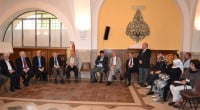Hate towards Hizmet Movement as a political strategy

Date posted: February 28, 2014
Yasemin Aydın & Fatih Ceran
A strong primordial feeling, hate relies on two essentials: a fragile self-perception and an existential threat. The presence of hate may be an indication of narcissism or an extreme lack of confidence. Either way, this is a problematic self-perception.
In the case of narcissism, the self is seen with some kind of ontological supremacy based on individual distinctiveness. The collective manifestations of narcissism may be justified as follows: On an ethnic basis, it paves the way for racism; on a religious basis, it promotes radical interpretations of religions; on an ideological basis, it creates extremist understandings.
In the case of a lack of confidence, it is even easier to create a perception that one is threatened. The subject is weak, defenseless and living in a ruthless world. An extreme lack of confidence also creates fear, which is fertile ground for hate.
Hater as a reactionary
A hater is a person who has never-ending hostility for whoever or whatever presents a threat. The threats don’t have to be real or even realistic, mostly they are a perception that is amplified by the fragile self-image of the hater. The hater’s concept of their self is sharp and exclusive. It employs clear cut definitions; however, this concept is usually defined in contract with other identities. This reactionary characteristic prevents the hater from developing a proactive identity. A hater is a hydrophobic person doomed to live on an island.
For the hater, there is always “us” and “them.” Whoever fits into the definition of “them” is dangerous, and the one who presents the biggest perceived danger becomes the very object of hate. Consequently, an emergency justifies, even necessitates, extraordinary measures be taken.
Corruption investigations that started on Dec. 17 caused immense political risk and were perceived as an existential threat by the AK Party. The corruption allegations were targeting the party at its heart, in the sense that the political discourse of the AK Party is built around religious/moral values and a systematic web of corruption would hardly fit in. If proven true, the allegations would create a lot of frustration among the electoral base. And if the AK Party members are prosecuted, it could bring some serious jail time. So, popularly and legally, it was undesirable.
So the case should have been handled very rationally and with great mastery. The “ruling elite“ within the party decided that they needed to make lot of fuss, enabling them to smokescreen the corruption allegations and bring the ongoing investigations to a halt. Moreover, they would once again have the ability to play the “victim“ in the eyes of the voter.
The political tradition of the party is advantageous. It had never attached itself to any political theory or text. So internal contradictions would not seem so obvious in this ever-pragmatic tradition.
A big and dangerous “frustration” was needed. No such thing was available in the country, so they had to make one. In this vein, a socially influential civic movement, the Hizmet movement became a target. The Hizmet movement had already been criticizing the government on its harsh policies. It said the government was employing repressive attitudes vis-à-vis democratic demands. Reforms had already come to a halt, the EU accesses ion process was make-believe, the settlement of the Kurdish issue was going nowhere and, most importantly, no political will was being put behind the making of a new and civilian Constitution. Moreover, the Hizmet was insisting on remaining in the civilian realm and resisting efforts to be placed under political control. In the eyes of the authoritarian elite of the party, the Hizmet already deserved to be “punished.”
It was not going to be easy; the Hizmet movement has broad support from every walk of life in the country. A very popular civic movement, many groups are sympathetic to the cause of the Hizmet. So, the image of the Hizmet had to be turned upside down.
They presented the Hizmet movement as an insidious group seeking to take control through the state apparatus by creating its own parallel state. They wanted people to believe that the Hizmet was collaborating with the US and Israel to topple the AK Party government. This juxtaposition would hurt the image of the Hizmet movement in the eyes of conservatives who constitute the AK Party’s central voter body. The Hizmet’s “treason“ would be the AK Party’s heroism.
This picture was clearly far from the public perception of the Hizmet movement, so people spreading propaganda have been utilized radically. Politicians and huge media outlets (recently bought by businessmen close to the AK Party) joined forces to repeat the same accusations over and over.
The orchestration of this immense PR project was apparently being done by Prime Minister Recep Tayyip Erdoğan himself, who kept making harsher-than-ever accusations during his rallies.
Prime Minister Erdoğan was targeting the volunteers of a civic movement in his country with visible “hate speech.” Hate became the most prominent element of his election campaign. He was trying to generate the sentiment of hate through the media he was controlling, and he was also trying to translate it into a political program. A perfect plan, though void of morality, which is employed only when useful.
Erdoğan needed to keep his audience fresh, so in time he raised the level of his accusations. He started using increasingly harsher rhetoric and started calling Hizmet volunteers “traitors,” “those who live in caves” and “assassins.” At a Religious Affairs Directorate meeting, the prime minister defined what “real faith” is and called Fethullah Gülen, the Islamic scholar who inspired the movement, a “false prophet.” This hate speech, the AK Party calculated, would bring them an election victory.
The AK Party has manipulated “wounds” in the social memory. The people are buying into this rhetoric, which claims “everyone is against us.” This story that there has been a “judicial coup” against the government is believable, because the path to democracy in Turkey has been interrupted by military coups before.
The Hizmet movement was portrayed as the Leviathan; it was big, monstrous and against the popular will. Erdoğan thought people would not remember that the Hizmet movement was a champion and supporter of steps toward democratization. How could a movement like that be making plots against the popular will?
Attacking the Hizmet would bring the AK Party significant political gain. First of all, because it has visible influence in every walk of life, a twisted image of the Hizmet would show how serious a threat it is. This would facilitate organizing the conservative camp behind Prime Minister Erdoğan, showing them they have to unite against this “powerful” traitor that is collaborating with external enemies. In this way, the AK Party would be able to divert public attention, an urgent matter for them, and justify its oppressive policies.
Despite the fact that there has been no evidence to support Erdoğan’s accusations, it hasn’t taken long for AK Party politicians to believe in this piece of fiction. Some of them would blindly follow their leader without thinking critically, and some are seeking political careers within the status quo. Some others have probably just fallen victim to the pro-AK Party media’s systematic smear campaigns.
This, again, fits perfectly with the political rhetoric of Erdoğan, who had already divided the country into “us” vs. “them” by calling whoever consumes alcohol a “drunkard” and whoever opposes his political views via street protests a “looter.” It was obvious that to mobilize his supporters, the prime minister needed objects to hate on. The Hizmet movement was an irresistible one, resisting politicization and insisting on independence.
Much-needed legal paralysis
The decision makers in the AK Party realized that they would go down in shame if they didn’t stop the corruption investigations. So they needed to legally paralyze the investigations. For this, the best way would be by threatening the judiciary — which Erdoğan did in his street rallies. “Oh, prosecutor,” he said, “I am not done with you yet.” He also wished to keep them and police officers in constant motion so that they wouldn’t be able make further investigations. More than 8,000 police officers have been reassigned, mostly to places irrelevant to their expertise. The Hizmet was portrayed as a state within a state, or a parallel state. Supposedly, the AK Party would just say that it was trying to get rid of this monster, this parallel state. There were heavy accusations made by the AK Party; the sentiments of the masses were being manipulated against the Hizmet, but there was no evidence. So the AK Party has not been able to open a court case against the Hizmet movement. Courts do not make decisions based on rhetoric; evidence is what they need.
Turkey will have three elections in one-and-a-half years — local, general and presidential elections. For an electoral victory, the AK Party needs to do two things: smokescreen the systematic corruption both legally and popularly, and keep the tension in society high. The fuel to keep the tension high can only come from extreme skepticism and the sentiment of hate.
This is why the AK Party organized its election campaign around hate speech in a calculated fashion.
Source: Todays Zaman , February 28, 2014
Tags: Defamation of Hizmet | Democracy | Freedoms | Hizmet (Gulen) movement | Turkey |
























